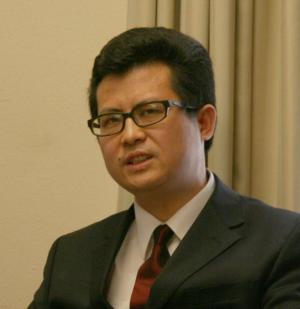In an outrageous ruling, the Guangzhou Municipal Tianhe District People’s Court added one more charge for rights activist Guo Feixiong (郭飞雄), also known as Yang Maodong (杨茂东), and convicted him of both “gathering crowds to disrupt order in public places”—for which he was tried—and “picking quarrels and provoking troubles.” The court sentenced Guo to six years of imprisonment.
Guo’s co-defendant, Sun Desheng (孙德胜), received a two-and-a-half-year prison term for “picking quarrels and provoking troubles.” In a separate case, the court convicted Liu Yuandong (刘远东), who was tried in January 2014, of “gathering crowds to disrupt order in public places” and sentenced him to three years in prison.
Both Li Jinxing (李金星) and Zhang Lei (张磊), lawyers for Guo, were shocked by Guo’s additional conviction. Calling it a “dark day,” Zhang said in a statement online, “I am beyond angry! This is too corrupt! The judge pretended to hear the defense argument but did not allow us to speak. As soon as we . . . began to state our argument, Judge Zheng Xin cut us off completely” (translation by HRIC). The lawyers say that Guo will appeal.
“Even before the clearly politicized addition of a new charge at sentencing, Guo Feixiong’s torture and abuse in detention raise serious concerns that his rights have been trampled upon,” said Sharon Hom, Executive Director of Human Rights in China. “The Chinese authorities must account for these violations under Chinese and international law.”
Guo’s abuse in detention since August 8, 2013 included sexual assault and harassment, being hooded, cuffed excessively, and psychologically tortured. Guo provided details in a June 2015 complaint he made against the Tianhe Detention Center for subjecting detainees, including himself, to daily strip searches, as well as a state compensation claim for being covered in a black hood, and having his wrists cuffed behind his back and his legs shackled tightly when bailiffs escorted him to a pretrial hearing and two court hearings. He wrote in the claim: “This physical—and especially psychological—torment has brought me great mental suffering. You may kill a fighter but not dishonor him.”
Guo was also denied access to a lawyer for three months in the initial period of his detention, has had no access to outdoors during his entire detention—more than 800 days—and has been kept in a cell with more than 30 other inmates.
In 2005, the UN Special Rapporteur on Torture identified the practice of “hooding” and excessive cuffing of prisoners and detainees as a problem. Yet, ten years later, such practices continue in China.
All of these activities are clear violations of the duties that China owes its citizens under international law, including the Convention Against Torture and Other Cruel, Inhuman or Degrading Treatment or Punishment, and make a mockery of China’s claim during its recent review by the Committee Against Torture that:
“‘Reports’ that some so-called ‘holders of different political views’ have been forbidden from having contact with the outside world and detained for periods exceeding three months and have been ‘tortured’ are untrue.”
In denouncing the ruling as “contemptible,” Guo’s wife Zhang Qing (张青), who is in the United States, is worried about Guo’s current condition, as his lawyers have reported that his memory and ability to express himself have markedly declined.
In his written statement for the sentencing, Guo appears undaunted by his ordeal. Guo wrote, “I am telling you frankly: your shameful means of political persecution can never achieve your end of wiping out the great waves of democratization raging in China. On the contrary, it will help the world to increasingly recognize your anti-democratic nature, which will urge more civilians to stand up courageously out of anger and awakening, rising like mountain peaks, to join in our ranks” (translation by HRIC).
The case against Guo, 49, a well-known writer, self-taught legal defender, and advocate for citizen activism, stemmed from his support for press freedom and his public calls for asset transparency. In January 2013, Guo protested in front of Southern Weekly magazine to support a strike by the magazine’s editorial staff against editorial interference by Party censors. In spring that year, he was involved in street actions in eight cities, including Wuhan, Guangzhou, and Shenzhen to call for asset transparency.

China’s 2015 Torture Review
Guo Feixiong